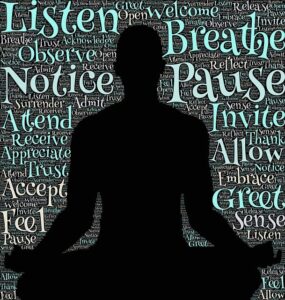I wrote this post four years ago, but the subject is important enough to redux. Plus, I needed the reminder. Maybe you do, too.

When chaos starts shaking the to-do list in my face, I close my eyes, lean back, and breathe… It’s amazing what a few deep breaths can do. There’s a running joke in my family that I’m so chill, I’m practically a corpse. It’s true! My blood pressure rarely, if ever, rises above 110/60, even under stressful conditions. And you know why? Because I take advantage of the most powerful and the most basic gift we have — the ability to breathe.
It may not sound like much of a superpower, but controlled breathing improves overall health. Controlled breaths can calm the brain, regulate blood pressure, improve memory, feed the emotional region of the brain, boost the immune system, and increase energy and metabolism levels.
The Brain’s Breathing Pacemaker
A 2016 study accidentally discovered a neural circuit in the brainstem that plays a pivotal role in the breathing-brain control connection. This circuit is called “the brain’s breathing pacemaker,” because it can be adjusted by alternating breathing rhythm, which influences our emotional state. Slow, controlled breathing decreases activity in the circuit while fast, erratic breathing increases activity. Why this occurs is still largely unknown, but knowing this circuit exists is a huge step closer to figuring it out.
Breathing Decreases Pain
Specifically, diaphragmatic breathing exercises. Ever watch an infant sleep? Their little tummy expands on the inhale and depletes on the exhale. They’re breathing through their diaphragm. We’re born breathing this way. It’s only as we grow older that we start depending on our lungs to do all the work.
Singers and athletes take advantage of diaphragmatic breathing techniques. Why not writers? If you find yourself hunched over the keyboard for too long, take a few moments to lay flat and concentrate on inflating your belly as you inhale through your nostrils. Then exhale while pulling your belly button toward your core. It takes a little practice to master the technique. Once you do, you can diaphragmatically breathe in any position. The best part is, it works!
Count Breaths for Emotional Well-Being
In 2018, another scientific study found that the mere act of counting breaths influenced “neuronal oscillations throughout the brain” in regions related to emotion. When participants counted correctly, brain activity showed a more organized pattern in the regions related to emotion, memory, and awareness, verse participants who breathed normally (without counting).
Controlled Breathing Boosts Memory
The rhythm of our breathing generates electrical activity in the brain that affects how well we remember. Scientists linked inhaling to a greater recall of fearful faces, but only when the participants breathed through their nose. They were also able to remember certain objects in greater detail while inhaling. Thus, researchers believe nasal inhalation triggers more electrical activity in the amygdala (brain’s emotional center). Inhaling also seems key to greater activity in the hippocampus, “the seat of memory,” according to Forbes.
Relaxation Response
The “Relaxation Response” (RR) is a physiological and psychological state opposite to the fight-or-flight response. RR therapy includes meditation, yoga, and repetitive prayer, and has been practiced for thousands of years. These stress-reducing practices counteract the adverse clinical effect of stress in disorders like hypertension, anxiety, insomnia, and aging.
Yet, research on the underlying molecular mechanisms of why it works remained undetermined until a 2017 study unearthed a fascinating discovery. Both short-term and long-term practitioners of meditation, yoga, and repetitive prayer showed “enhanced expression of genes associated with energy metabolism, mitochondrial function…” and more efficient insulin secretion, which helps with blood sugar management. Relaxation Response also reduces the expression of genes linked to inflammatory responses and stress-related pathways. In simpler terms, controlled breathing helps boost the immune system and improve energy metabolism.
Creativity
This probably goes without saying, but I’m mentioning it anyway. Good brain health increases creativity. Creativity helps inspiration. And inspiration ups the word count.
 Shawnee and Mayhem continue to wreak havoc on the Killzme Corporation — the largest animal trafficking ring in the country — by killing one poacher at a time. The stakes grow increasingly higher when the nefarious group retaliates by putting a bounty on their heads.
Shawnee and Mayhem continue to wreak havoc on the Killzme Corporation — the largest animal trafficking ring in the country — by killing one poacher at a time. The stakes grow increasingly higher when the nefarious group retaliates by putting a bounty on their heads.
Meanwhile, the traffickers set their sights on capturing Orca for profit and pleasure.
With a ticking clock and no place left to hide, Shawnee and Mayhem alternate between undercover surveillance and clandestine battles to save their loved ones and the Innocent Ones from Killzme’s evil plans. Skills are tested. Tenuous alliances are formed. Not everyone will make it out alive.
Set in a world of cultural wonder, environmental threats, and looming danger, this heart-stopping eco-thriller will have you glued to the page from the first sentence to the last.
Now available for preorder! Steal it for the special preorder price of 99c.

Well my friend and I hit a big milestone this weekend in that we finally got our first manuscript ready to share with a couple of betas (a big deal for me since, when working solo, I will hold onto a manuscript forever!). But I’ve looked at that manuscript so many times now I’m numb and need a break from it and we need fresh eyes on it. A good time to incorporate some breathing exercises.
Thanks for the reminder of this tool we don’t often remember to use!
Definitely, Brenda. Sounds like the perfect time to relax and breathe. Good luck!
Great info, Sue.
You’ve probably seen the ads on TV. Someone is always looking for an angle to make money, using the data above to help treat hypertension, with a simple device to watch the changes in blood pressure while doing the breathing exercises.
Thanks for the links to the research.
Bottom line, the brain is a wonderfully created organ that we only begin to understand. The research is fascinating.
I look forward to reading your book. Have a great week!
Thanks, Steve!
Yes, I agree. All brain research fascinates me. Speaking of, I included a scene in Merciless Mayhem that touches on the brains of cetaceans, specifically Orca. Hope you enjoy the thrill-ride!
Good morning, Sue! Thanks so much for sharing this helpful post once more. I always need the reminder, since breath can work wonders for reducing stress, energizing us, helping with our creativity, all the things you mention.
Yoga has also showed me different ways to breathe, among them Ujjayi breath, a version of the diaphragmatic breathing you discuss, and box breathing–4 count inhale, 4 count hold, 4 count exhale, 4 count hold, repeat
Congratulations on your upcoming release. I pre-ordered it. Have a wonderful week, my friend!
Thanks, Dale! I included the box breathing method in Merciless Mayhem. Hope you enjoy it!
Hi Sue,
Funny you should mention breathing and meditation. Mark Sullivan (Beneath a Scarlet Sky) was the keynote at the Flathead Writers Conference this past weekend. He devoted one presentation to meditation and breathing exercises. He introduced us to “heart coherence” that means the mind, body, and heart are in rhythm.
Then up pops your post this morning, repeating the same themes. Guess that’s a signal to pay more attention to my breathing!
Congratulations on your new book! Preordered!
Thank you, Debbie! Love the term “heart coherence.” When the heart, mind, and body are in rhythm, it leads to a more peaceful existence.
Hope you enjoy Merciless Mayhem!
Interesting post, Sue! When I’m having trouble falling asleep at night, I place one hand on my chest and the other on my diaphragm and deliberately slow my breathing. Works like a charm…unless those pesky characters start bouncing on the bed. 🙂
I recently read another discussion regarding experiencing heart attack symptoms while alone and trying to get help. Maybe Steve could weigh in here.
If I’m alone, and experiencing arm pain, shortness of breath, etc., all the usual suspects, and trying to stay conscious while awaiting help, I can do two things to help myself. Take a slow, deep breath punctuated by a hard, prolonged cough. Repeat. And repeat. Deep breaths bring oxygen to the lungs, and the cough helps maintain blood circulation.
The hard part is that if I don’t start this procedure immediately, I have maybe 10 seconds before I lose consciousness. And, of course, it might not work. 🙁
The human body is truly amazing.
I do the same thing when I can’t sleep, Deb! Rarely do I deep-breathe more than a few rounds before I drift off to slumberland.
Didn’t know about the cough. Thanks for adding!
Deb,
A family member with an occasional irregular heartbeat can often regulate the rhythm by coughing. A young, inexperienced cardiologist told him that couldn’t work…until my relative showed him.
I do try to practice deep breathing, through the nose (except in the men’s rooms at LAX). It really does help with sleep, as you and Deb mentioned. It slows your heart rate, which is the key to falling asleep. There’s something called the 4-7-8 breathing technique: In through your nose counting to four, hold for seven, out through the mouth counting to eight.
My other technique for falling asleep is reading in bed. Two pages, and I’m out!
Haha. That’s why I can’t read in bed! Yes, I’ve done the 4-7-8 breathing technique, but box breathing is easier. I don’t have as much hot air as I used to. 😉
But, reading in bed backfires if it’s one of yours! Or Sue’s. Or Debbie’s. Or . . . 🙂
😎
Hahaha!
😉
Just got back from Montana and the Flathead Writers Conference, and their program included a break each day with an instructor doing stretches for places writers sitting at computers all day get tension. Simple yoga poses.
Then, yesterday one of the speakers was all about how he learned to be productive through meditation, so we did all sorts of breathing exercises with him.
Something different from any other conferences I’ve been to, but helpful.
Love that, Terry. I’m a fan of meditation. Works wonders for me. Hope you had a blast!
Thanks for the reminders, Sue! We are certainly “fearfully and wonderfully made.”
Best of luck with the new book. I just pre-ordered my copy!
Thanks, Kay! Perfect description for how we’re made!